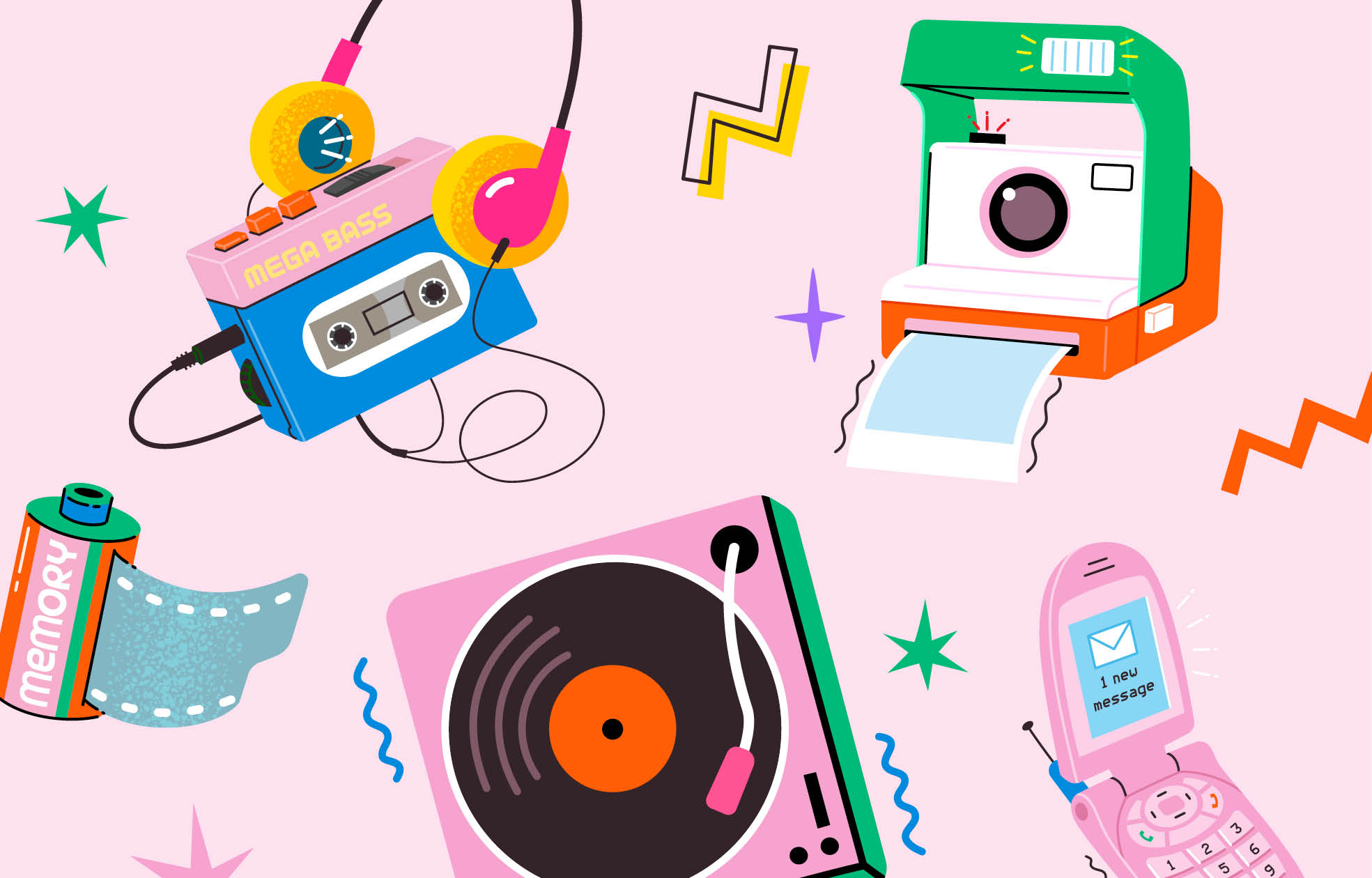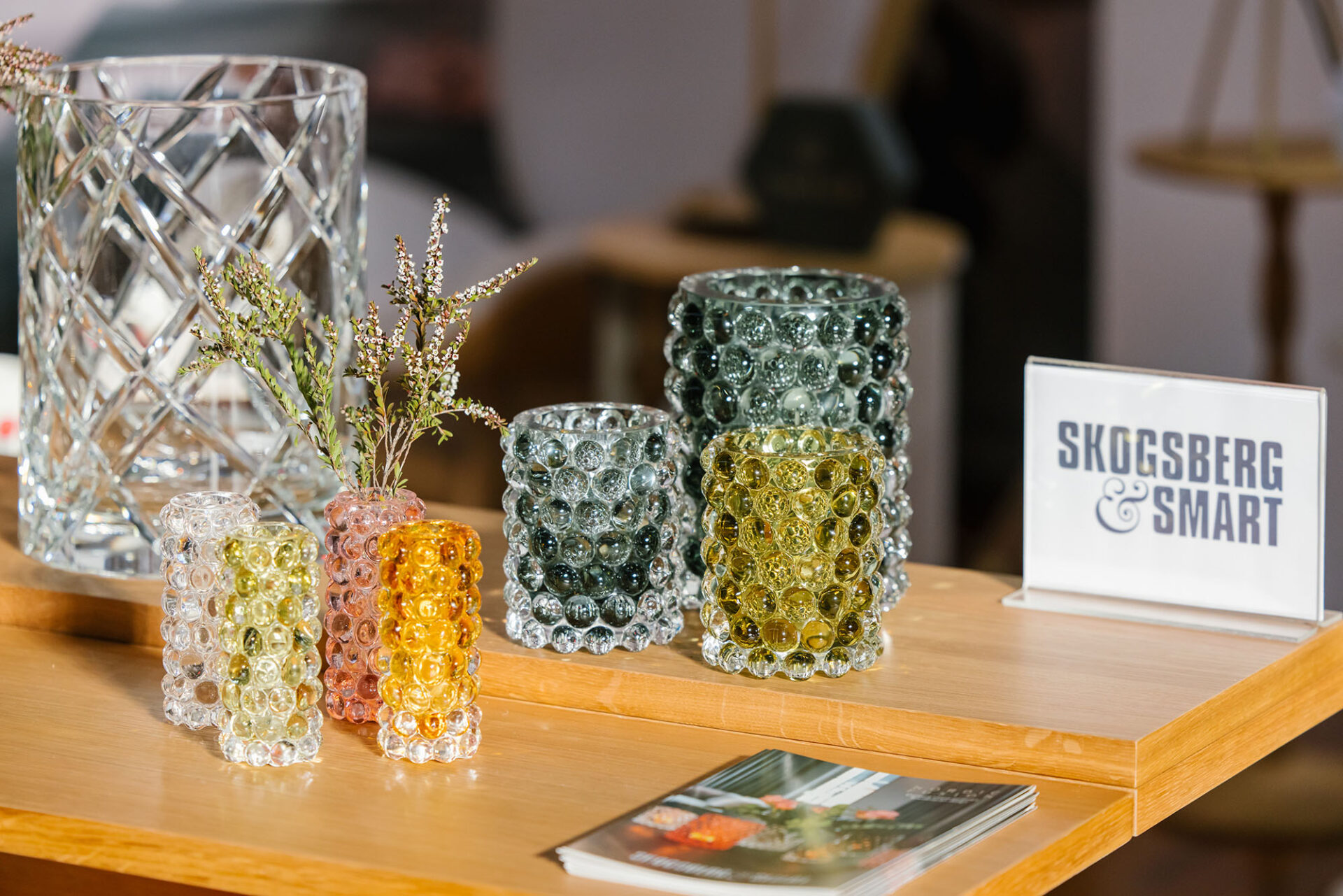The Bottom Line
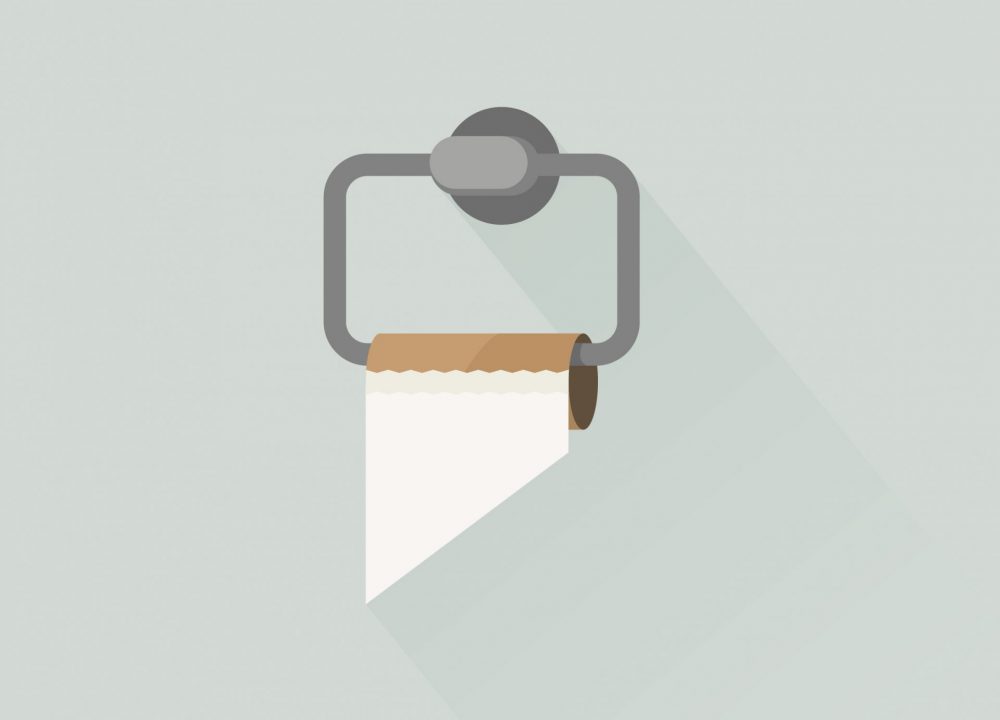
- Words by Peppermint
Toilets: they’re a fact of life, and most of us don’t think twice when we pay our daily visits to the ol’ porcelain throne. But of course, it’s not just our (ahem) number ones and twos that travel the pipes – we flush all manner of things down the loo, and it turns out that most of them are a real source of constipation for the environment.
Let’s start with toilet paper. Sadly, our trusty TP isn’t as kind to the planet as it is to our posteriors. It’s basically a single-use paper product and, on average, each of us uses 57 sheets a day – that’s the equivalent of 384 trees over the course of a lifetime. And it’s not just the trees that are getting a bum deal – it takes 37 gallons of water to produce a single roll of TP, and manufacturing and transportation uses 17.3 terawatts of electricity every year. According to theworldcounts.com, the loo roll we use could stretch around the planet every two minutes, or travel to the sun and back every 10 days.
…the loo roll we use could stretch around the planet every two minutes, or travel to the sun and back every 10 days.
But toilet paper is only part of the problem. Studies show that we now use 14,000 wet wipes every second. And so-called ‘flushable wipes’ are anything but – according to Sydney Water, they’re responsible for 75% of sewer blockages in the city’s waste-water system because they don’t break down in the way toilet paper does. Most wipes are specifically designed to be robust, and are often reinforced with cellulose and viscose along with cleaning products and chemicals.
In 2017, a 130-tonne, 250-metre-long ‘fatberg’ – literally a giant mass of congealed fat, nappies, baby wipes and other things straight from the loo chute of your nightmares – blocked an entire section of London’s sewage network, taking nine weeks to clear. Parts of the Whitechapel fatberg went on to be displayed at the Museum of London, with curator Vyki Sparkes saying: “We are all a little bit responsible for the existence of fatbergs. That’s the power of an object: visitors are actually con- fronted by the waste our society creates. If people walk away and think a little bit about how these things are created and what our role has been in them, that’s my job done.” The Whitechapel fatberg was not an isolated case: many others have been found since.
Studies show that we now use 14,000 wet wipes every second. … They’re responsible for 75% of sewer blockages in the city’s waste-water system because they don’t break down in the way toilet paper does.
It’s interesting to note that only 30% of the world’s population uses toilet paper. In Japan, more than 80% of households use bidets – the same goes for many European countries, including Italy and France, where bidets originated. Most Southeast Asian countries also use water for cleansing. Bidets are not only more hygienic than toilet paper, but also much less taxing on our wallets, our water and our world.
We can’t keep washing our hands of this problem – our environment’s (literally) going down the drain – so we’ve found a few different toilet products, from bidets to bamboo, that can help make your trips to the can a little more eco-conscious.
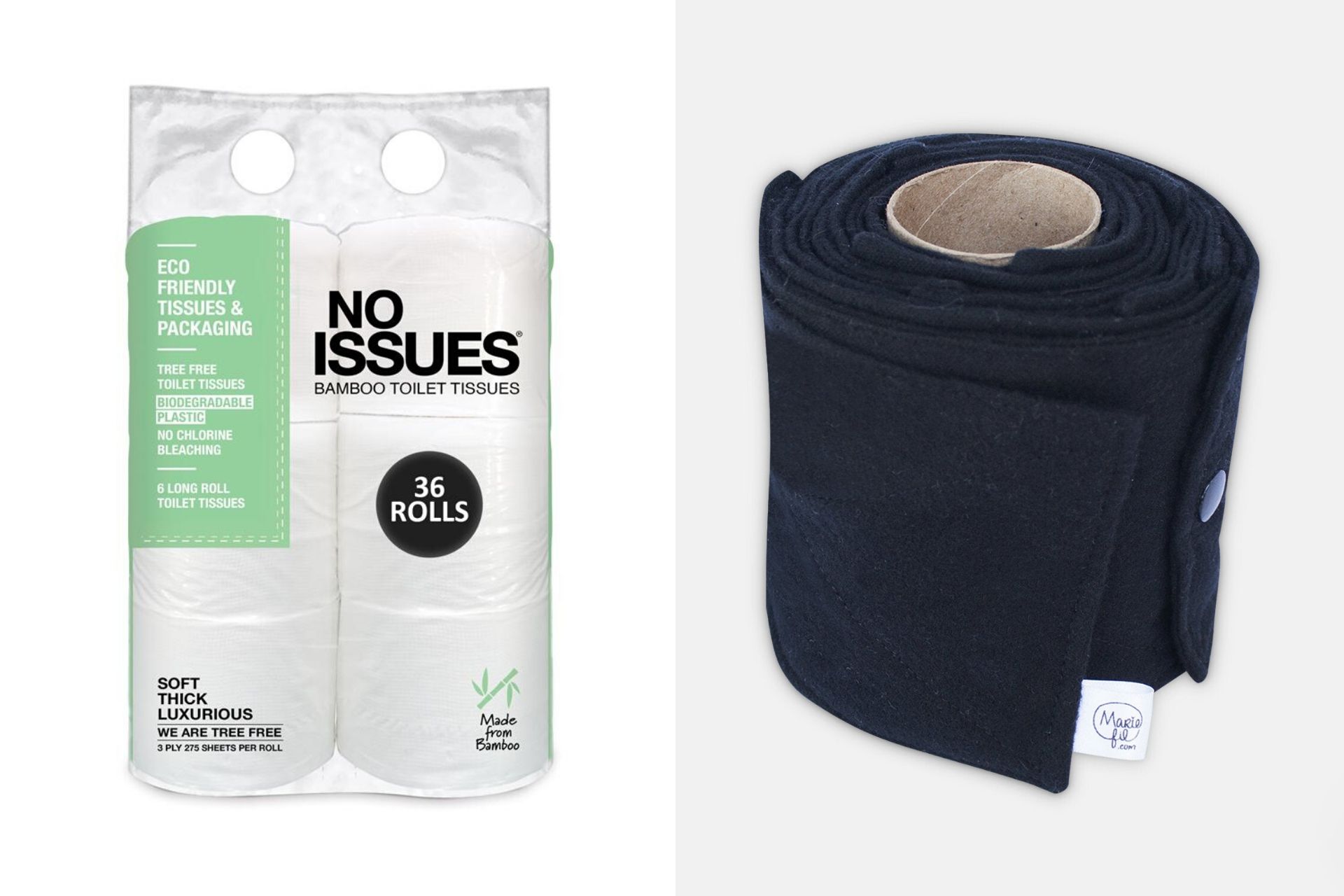
NO ISSUES BAMBOO TOILET PAPER
Made from bamboo and sugarcane fibres, the unbleached toilet tissue from No Issues is a more sustainable option than its tree-based counterpart. Bamboo is a fast-growing plant that can be harvested in a much shorter timeframe than virgin trees, making it better for both your own behind and the environmental impact you’ll leave behind.
noissues.com.au
REUSABLE TOILET PAPER
Yep, it’s a thing – and judging by a quick Google search, it’s not a thing the internet is down with. However, it’s our job to let you know what your options are, and this is one of them. There’s a plethora of ‘unpaper’ options (also known as ‘the family cloth’) on Etsy – essentially glorified wash cloths in squares or snapped-together rolls to be washed and reused. Fan(ny)s world- wide extol their softness, and their money- and planet-saving virtues.
mariefilcreations.etsy.com
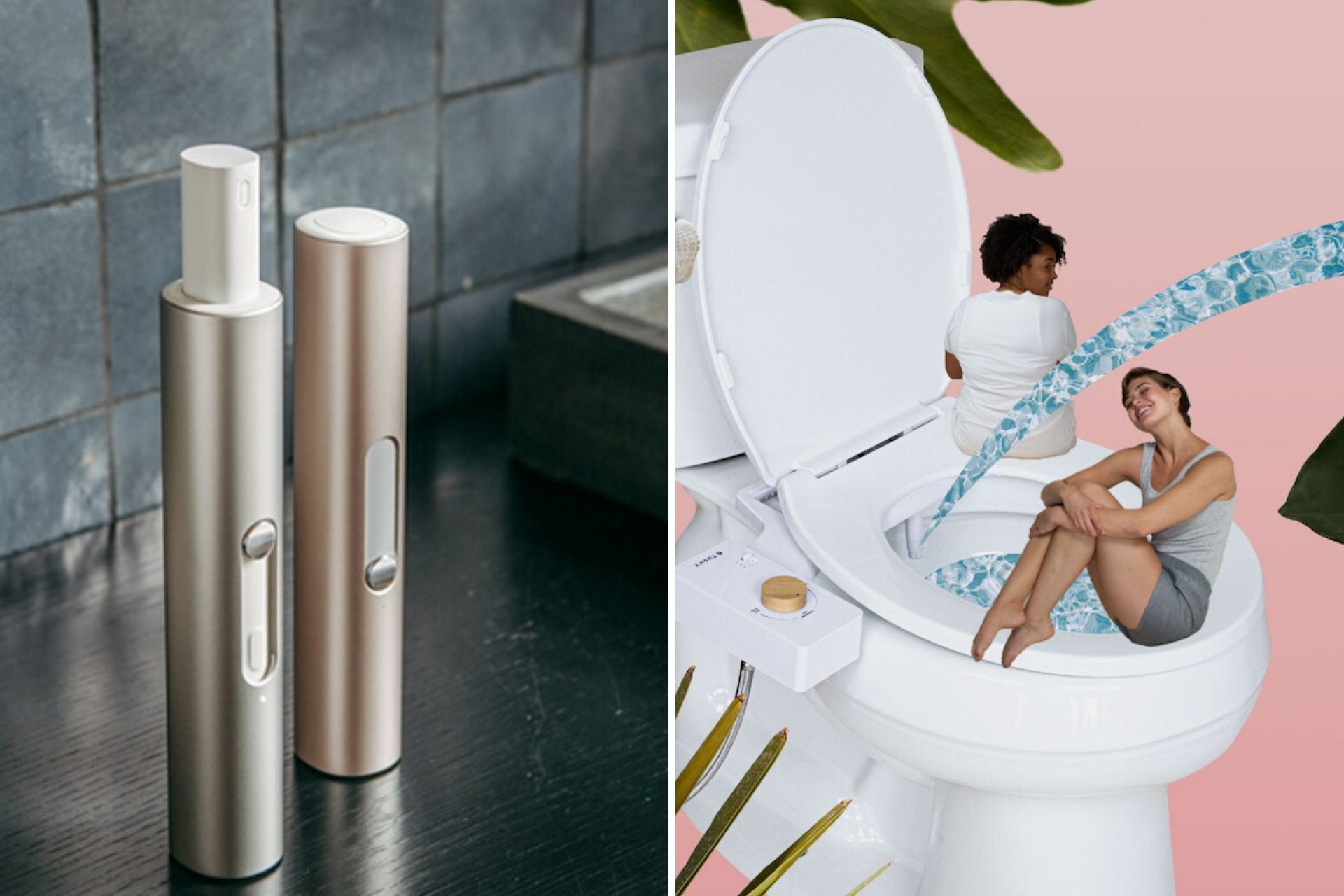
SONNY PORTABLE BIDET
With its sleek, minimalist design, the Sonny portable bidet looks like it would be more at home in an Apple Store than a bathroom. This rechargeable handheld device is designed to “wipe away the past” – aiming to reduce your environmental burden while increasing personal cleanliness. The Sonny raised almost $1.8 million in crowdfunding, and is still in its production phrase – for a sparkling clean, happy posterior, you’ll have to wait until May 2020.
sonny.com
TUSHY BIDET
Founder of Thinx period underwear Miki Agrawal has now set her sights on another startup that’s focused on our nether regions. With similarly irreverent ad campaigns, the Tushy is a bidet that reduces water usage and eliminates toilet paper, attach- ing easily to your toilet’s water sup- ply without plumbing or electricity. Various pressure controls combined with a nozzle adjuster help you get the clean booty of your dreams, and Tushy also sells washable bamboo cloth towels to pat your privates dry after each wash.
hellotushy.com
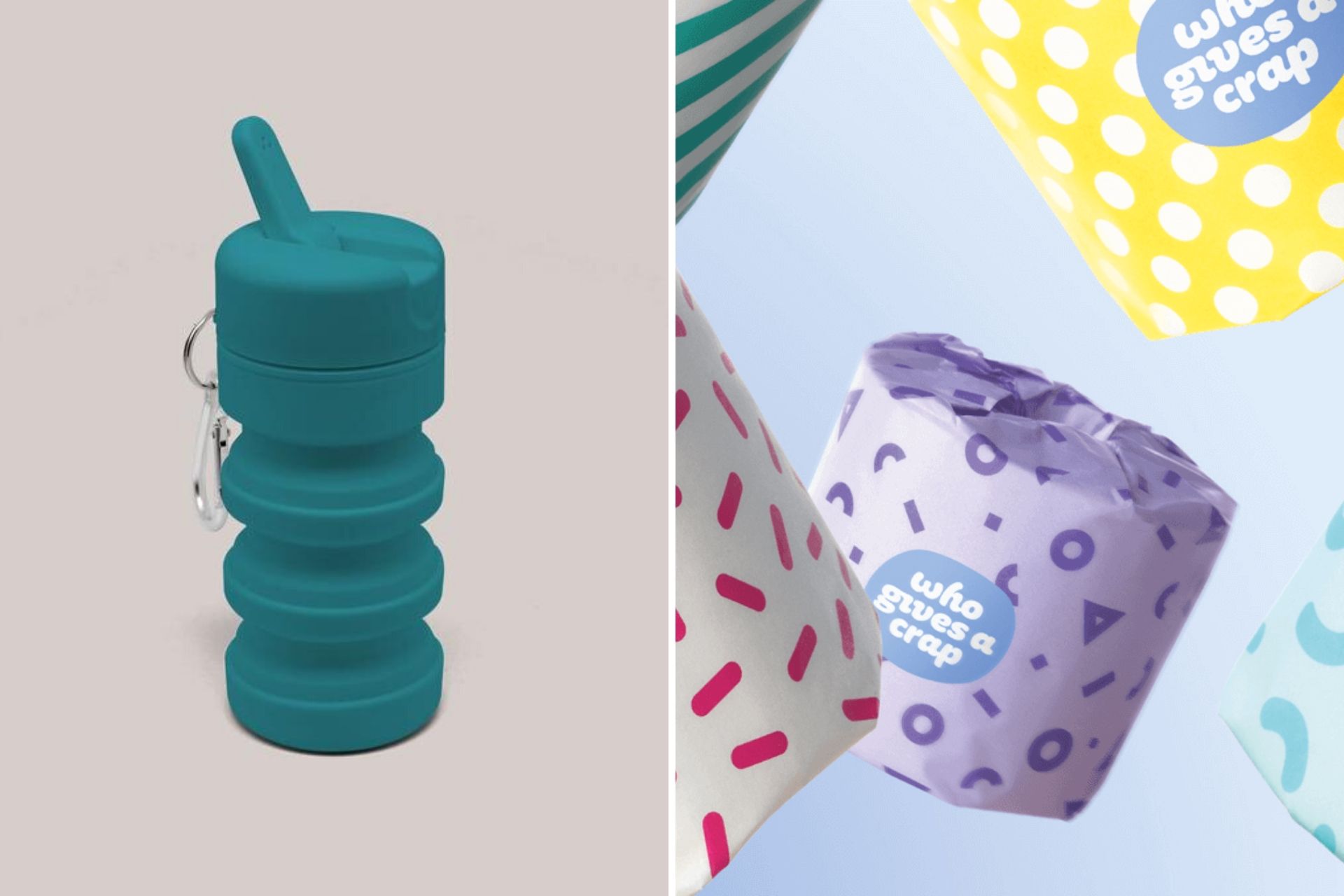
TUSHY TRAVEL BIDET
Also from Tushy is the portable travel bidet, which looks a little like a reusable water bottle – perfect for being inconspicuous, possibly less so for accidental mix-ups. Tushy Travel is a collapsible squeezy bottle with a hinged nozzle and a carabiner for popping on your handbag when pooping on the go. You’ll likely need a good aim and some TP to dry off afterwards (unless you want to cart around reusable cloths – insert shudder emoji here), but your clean, smug, eco-conscious, well-travelled rear end will thank you.
hellotushy.com
WHO GIVES A CRAP TOILET PAPER
Social enterprise Who Gives A Crap certainly do just that – they donate 50% of their profits to help build toilets for those in need and improve sanitation in the developing world. They also aim to save trees, water and energy with their 100% recycled toilet paper that’s delivered to your door with an ongoing subscription – meaning you’ll never have to make an emergency supermarket dash again. For discerning derrières, their premium bamboo range has a lower impact than virgin pulp paper.
whogivesacrap.org
This article was originally published in Issue 45.
JOIN OUR MAILING LIST
Brighten up your inbox with our not-too-frequent emails featuring Peppermint-related news, events, competitions and more!
explore
More articles
Look, I don’t want to make anyone panic but IT’S DECEMBER!!! If you’re planning to give homemade gifts, you’re going to have to act fast. …
Hang out with us on Instagram
🌻 The Paddington 🌻
This is a much-loved staple, created for Issue 50 in 2021. We love seeing the #PeppermintPaddingtonTop continually popping up in our feeds!
How stunning is our model Elon MelaninGoddessEfon – she told us it was one of the first times she had been asked to come to a shoot with her natural hair. 🌻
We worked with South African patternmaker Sarah Steenkamp of @FrenchNavyNow_ to create this wardrobe essential – the perfect puff-sleeve blouse. Raglan sleeves make it the ultimate beginner sew, plus the gorgeous back buttons let you add your own personal twist.
Pattern via the link in bio! 🪡
Photos: @KelleySheenan
Fabric: @Spoonflower
Model: MelaninGoddessEfon

“In the 1940’s, Norwegians made and wore red pointed hats with a tassel as a form of visual protest against Nazi occupation of their country. Within two years, the Nazis made these protest hats illegal and punishable by law to wear, make, or distribute. As purveyors of traditional craft, we felt it appropriate to revisit this design.”
Crafters have often been at the heart of many protest movements, often serving as a powerful means of political expression. @NeedleAndSkein, a yarn store in Minnesota, are helping to mobilise the craftivists of the world with a ‘Melt The Ice’ knitting pattern created by @Yarn_Cult (with a crochet pattern too), as a way of peaceful protest.
The proceeds from the $5 pattern will go to local immigrant aid organisations – or you can donate without buying the pattern.
Raise those needles, folks – art and craft can change the world. 🧶
Link in bio for the pattern.
Images: @Gather_Fiber @NeedleAndSkein @a2ina2 @KyraGiggles Sandi.204 @WhatTracyMakes AllieKnitsAway Auntabwi2
#MeltTheIce #Craftivism #Knitting #CraftForChange

TWO WEEKS TO GO! 🤩
"The most important shift is moving from volume-led buying to value-led curation – choosing fewer, better products with strong ethics, considered production and meaningful stories. Retailers have real influence here: what you buy signals what you stand for. At Life Instyle, this means using the event to discover and invest in small-scale, planet-considerate brands that align with your values and your customer’s conscience. Consumers don’t need more things; they need better things, and retailers play a key role in selecting, contextualising, and championing why those products matter."
Only two more weeks until @Life_Instyle – Australia`s leading boutique retail trade show. If you own a store, don`t miss this event! Connect with designers, source exquisite – and mindful – products, and see firsthand why this is Australia’s go-to trade show for creatives and retailers alike. And it`s free! ✨️
Life Instyle – Sydney/Eora Country
14-17 February 2026
ICC, Darling Harbour
Photos: @Samsette
#LifeInstyle #SustainableShopping #SustainableShop #RetailTradeEvent

Calling all sewists! 📞
Have you made the Peppermint Waratah Wrap Dress yet? Call *1800 I NEED THIS NOW to get making!
This gorgeous green number was modelled (and made) by the fabulous Lisa of @Tricky.Pockets 🙌🏼
If you need a nudge, @ePrintOnline are offering Peppermint sewists a huge 🌟 30% off ALL A0 printing 🌟 when you purchase the Special Release Waratah Wrap Dress pattern – how generous is that?!
Head to the link in bio now 📞
*Not a real number in case that wasn`t clear 😂
#PeppermintWaratahWrapDress #PeppermintPatterns #SewingPattern #WrapDress #WrapDressPattern

8 Things to Know About January 26 - from @ClothingTheGaps:
Before you celebrate, take the time to learn the truth. January 26 is not a day of unity it’s a Day of Mourning and Survival for Aboriginal and Torres Strait Islander peoples.
It marks the beginning of invasion, dispossession, and ongoing colonial violence. It’s time for truth-telling, not whitewashed history.
Stand in solidarity. Learn. Reflect. Act.
✊🏽 Blog written by Yorta Yorta woman Taneshia Atkinson.
🔗 Link in bio of @ClothingTheGaps to read the full blog
#ChangeTheDate #InvasionDay #SurvivalDay #AlwaysWasAlwaysWillBe #ClothingTheGaps

As the world careens towards AI seeping into our feeds, finds and even friend-zones, it`s becoming increasingly hard to ignore.
We just wanted to say that here at Peppermint, we are choosing to not print or publish AI-generated art, photos, words, videos or content.
Merriam-Webster’s human editors chose `slop` as the 2025 Word of the Year – they define it as “digital content of low quality that is produced usually in quantity by means of artificial intelligence.” The problem is, as AI increases in quality, it`s becoming more and more difficult to ascertain what`s real and what`s not.
Let`s be clear here, AI absolutely has its place in science, in climate modelling, in medical breakthroughs, in many places... but not in replacing the work of artists, writers and creatives.
Can we guarantee that everything we publish is AI-free? Honestly, not really. We know we are not using it to create content, but we are also relying on the artists, makers and contributors we work with, as well as our advertisers, to supply imagery, artwork or words created by humans. AI features are also creeping into programs and apps too, making it difficult to navigate. But we will do our best to avoid it and make a stand for the artists and creatives who have had their work stolen and used to train AI machines, and those who are now losing work as they are replaced by this energy-sapping, environment-destroying magic wand.
Could using it help our productivity and bottom line? Sure. And as a small business in a difficult landscape, that`s a hard one to turn down. We know other publishers who use AI to write stories, create recipes, produce photo shoots... but this one is important to us.
`Touch grass` was also a Merriam-Webster Word of the Year. We`ll happily stick with that as a theme, thanks very much. 🌿








